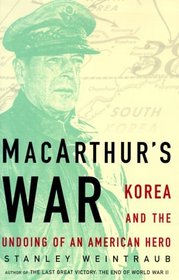I knew how close we came to 'losing' the Korean War, but until I read this book, I didn't know just how close it was.
This is far from being the first or only book which exposes MacArthur for the egoist he is and the habitual lies he generated. For example, he liked to tell people he commanded the "Rainbow" division in World War I. Well, he did, for eleven days, but ten of those days were after November 11, 1918, when the war ended.
Plus, during World War I, he was awarded a medal for an action he wasn't even in, as he was nine miles away at the time. The real heroes were the commanders of three infantry and one machine-gum battalions.
During World War II, his press releases were some of the best examples of "false news" ever generated. Especially those citing "low casualties" in taking enemy positions. Often he announced the capture of positions where his troops were still engaged in heavy combat with the Japanese.
I saw two small problems with this book. In one, the author mentions the "low casualties" MacArthur's forces took in World War II. Probably because this lie is embedded in so many World War II books. The second is where the author refers to the Marine Corps' "Fort Quantico" in Virginia. The Marines---as I was one, I know this---don't have forts, but camps. Examples of these are Camp Pendleton on the West Coast and Camp Lejeune on the East Coast. The base at Quantico is referred to as "Marine Corps Base Quantico."
Another good book showing about how MacArthur didn't care much for the troops under his command is "The Ghost Mountain Boys," a mid-west infantry division of World War II. The author is James Campbell.
This is far from being the first or only book which exposes MacArthur for the egoist he is and the habitual lies he generated. For example, he liked to tell people he commanded the "Rainbow" division in World War I. Well, he did, for eleven days, but ten of those days were after November 11, 1918, when the war ended.
Plus, during World War I, he was awarded a medal for an action he wasn't even in, as he was nine miles away at the time. The real heroes were the commanders of three infantry and one machine-gum battalions.
During World War II, his press releases were some of the best examples of "false news" ever generated. Especially those citing "low casualties" in taking enemy positions. Often he announced the capture of positions where his troops were still engaged in heavy combat with the Japanese.
I saw two small problems with this book. In one, the author mentions the "low casualties" MacArthur's forces took in World War II. Probably because this lie is embedded in so many World War II books. The second is where the author refers to the Marine Corps' "Fort Quantico" in Virginia. The Marines---as I was one, I know this---don't have forts, but camps. Examples of these are Camp Pendleton on the West Coast and Camp Lejeune on the East Coast. The base at Quantico is referred to as "Marine Corps Base Quantico."
Another good book showing about how MacArthur didn't care much for the troops under his command is "The Ghost Mountain Boys," a mid-west infantry division of World War II. The author is James Campbell.
Karen L. (Mae) reviewed MacArthur's War: Korea and the Undoing of an American Hero on + 59 more book reviews
Abridged
MacArthur's War is the gripping story of the Korean War and its soldiers and of the one soldier who dominated the rest.
MacArthur's War is the gripping story of the Korean War and its soldiers and of the one soldier who dominated the rest.




